MercoPress. South Atlantic News Agency
Tag: European Central Bank
-
Monday, December 5th 2016 - 11:06 UTC
Euro skids to a 20-month low on Rienzi's resignation; all eyes on EU Central bank

The Euro skidded to a 20-month low after Italian Prime Minister Matteo Renzi said he would resign following a stinging defeat on constitutional reform that could destabilize the country's shaky banking system. Renzi's defeat deals a body blow to the European Union already reeling under anti-establishment anger that led to the shock exit of UK from the club in June this year.
-
Tuesday, June 14th 2016 - 12:04 UTC
ECB purchases 348bn Euros of corporate bonds in the first three days
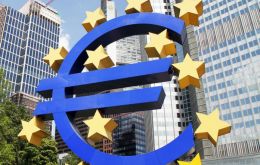
The European Central Bank bought 348 million Euros of corporate bonds in the first three days of such purchases last week, it said on Monday, as part of its 1.74 trillion Euro scheme to revive growth and inflation. The figures are at the upper end of analyst predictions, indicating a strong start for the program and suggesting that the ECB was keen to show it can buy significant volumes.
-
Monday, March 2nd 2015 - 06:21 UTC
Germany sells five-year notes in Euros at a negative yield of -0.08%

The German government sold five-year notes at a negative yield for the first time in its history on Wednesday. The milestone comes as the European Central Bank prepares to begin a bond-buying program, known as quantitative easing, in hopes of stimulating growth in economies across the Continent.
-
Friday, February 20th 2015 - 05:00 UTC
Negative inflation in France adds to Euro-zone stagnation and deflation fears

Inflation in France, the Euro zone's second-biggest economy, was negative in January for the first time in more than five years, the national statistics agency said on Thursday.Prices declined by 0.4% in January compared to the same month last year, INSEE said, noting that France has not seen negative inflation since October 2009.
-
Wednesday, January 21st 2015 - 06:33 UTC
Denmark, following on Switzerland, forecasted to remove Krone's peg to the Euro
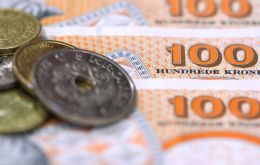
Denmark has cut its key interest rate to prevent the Krone from strengthening in the wake of Switzerland's decision to scrap the franc's peg to the Euro. There has been speculation that Denmark could follow the Swiss move by removing the Krone's link to the Euro.
-
Monday, August 11th 2014 - 22:19 UTC
Leading economies showing overall steady growth trend, says OECD
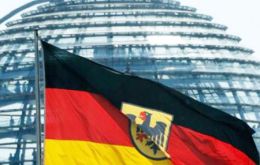
Leading economies are showing a steady growth trend overall, although Britain is doing particularly well and Japan and Germany are showing signs of losing pace, the OECD (Organization for Economic Cooperation and Development) said on Monday.
-
Wednesday, June 4th 2014 - 08:51 UTC
Euro zone entering 'deflation' zone; ECB expected to boost growth
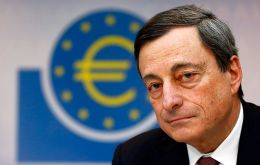
Euro-zone inflation fell to 0.5% in May, down from 0.7% in April and well below the European Central Bank's 2% target. The fall means the ECB will be expected to take steps to boost growth and counter the threat of deflation when it meets on Thursday.
-
Saturday, May 10th 2014 - 00:13 UTC
ECB ready to take action against low inflation and strong Euro, says Dragui
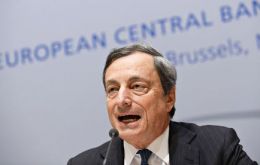
The European Central Bank is ready to take action next month to boost the Euro zone economy if updated inflation forecasts merit it, said ECB president Mario Dragui warning outsiders not to pressure the bank into action.
-
Wednesday, April 16th 2014 - 04:20 UTC
European central bank considering 'further stimulus' if inflation remains low

European Central Bank (ECB) has said it will provide “further stimulus” to the Euro zone economy if inflation in the bloc continues to remain low. Mario Draghi, said a stronger Euro would act as a trigger to looser monetary policy.
-
Thursday, March 6th 2014 - 21:07 UTC
Fearing deflation Euro bank leaves interest rate unchanged at record low

The European Central Bank (ECB) kept on Thursday its benchmark interest rate at its record low of 0.25%, despite fears inflation could get stuck in a “danger zone” below 1%. The bank slightly raised its forecast for growth to 1.2% in 2014, but dropped its inflation estimate.
